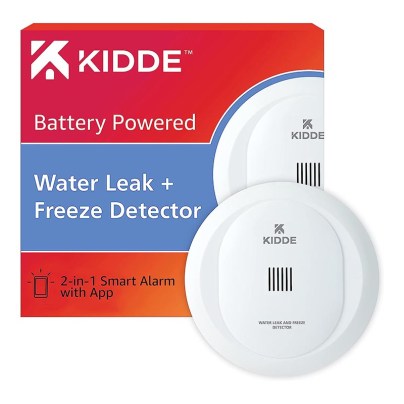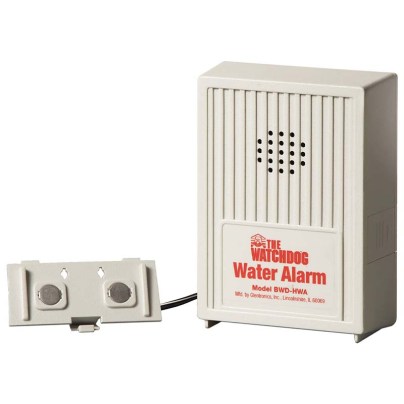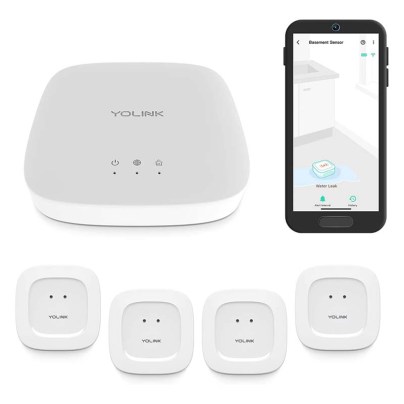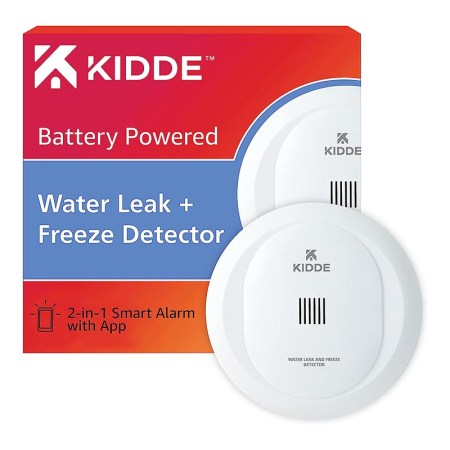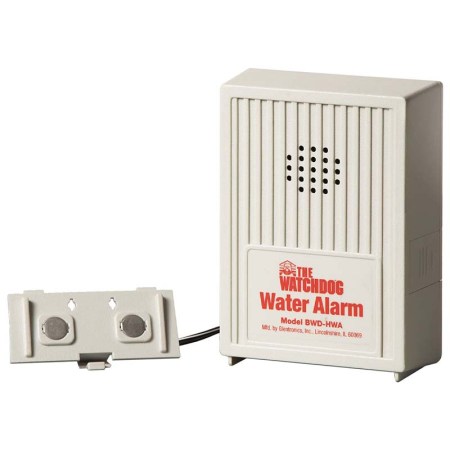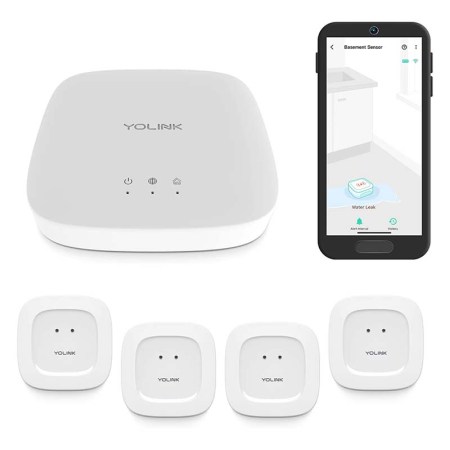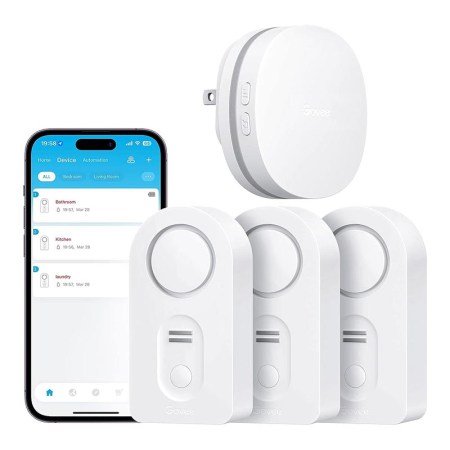We may earn revenue from the products available on this page and participate in affiliate programs. Learn More ›
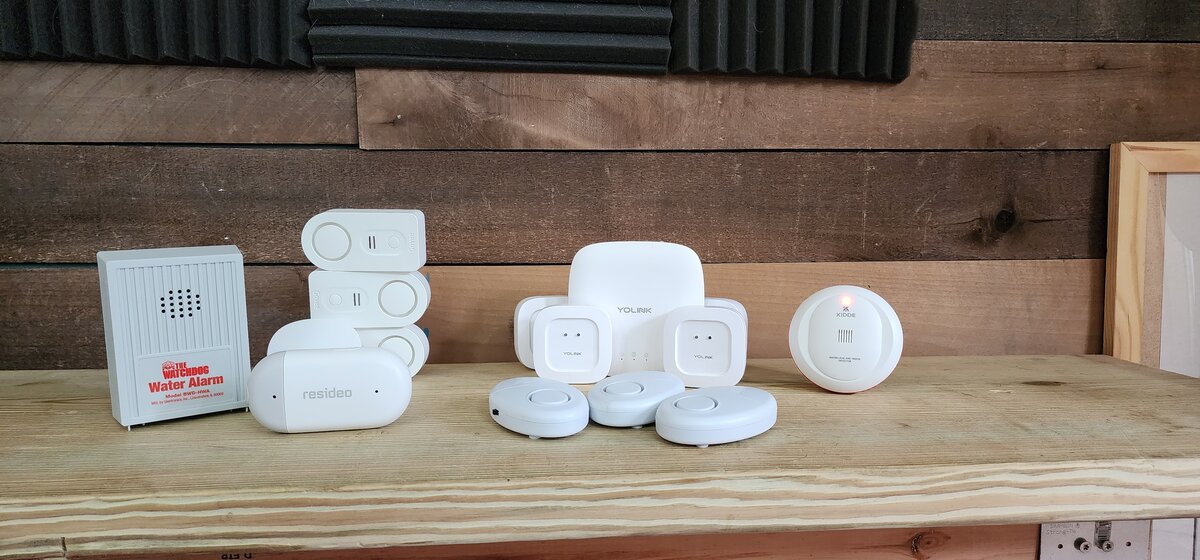
Water leaks are incredibly common, with over 2.5 million homeowners experiencing one yearly. Not only do water leaks elevate the water bill, but the resulting damage often costs thousands of dollars to repair. Identifying water leaks as soon as they start is a wise way to avoid a financially devastating problem.
Several varieties of water-leak detectors on the market serve this very purpose while offering additional useful features. To see just how effective they are, we performed hands-on testing on a variety of top models to see if they live up to the manufacturers’ claims. In this guide, we explain our testing process and results. We also explore the factors to consider when purchasing a leak detector so you can find the best water-leak detector for your home.
- BEST OVERALL: Kidde 60WLDR-W Water Leak + Freeze Detector
- BEST BANG FOR THE BUCK: The Basement Watchdog BWD-HWA Water Alarm
- UPGRADE PICK: YoLink Water Leak Sensor & Hub Smart Home Starter Kit
- BEST WI-FI: Govee Wi-Fi Water Sensor Alarm + 3 Sensors
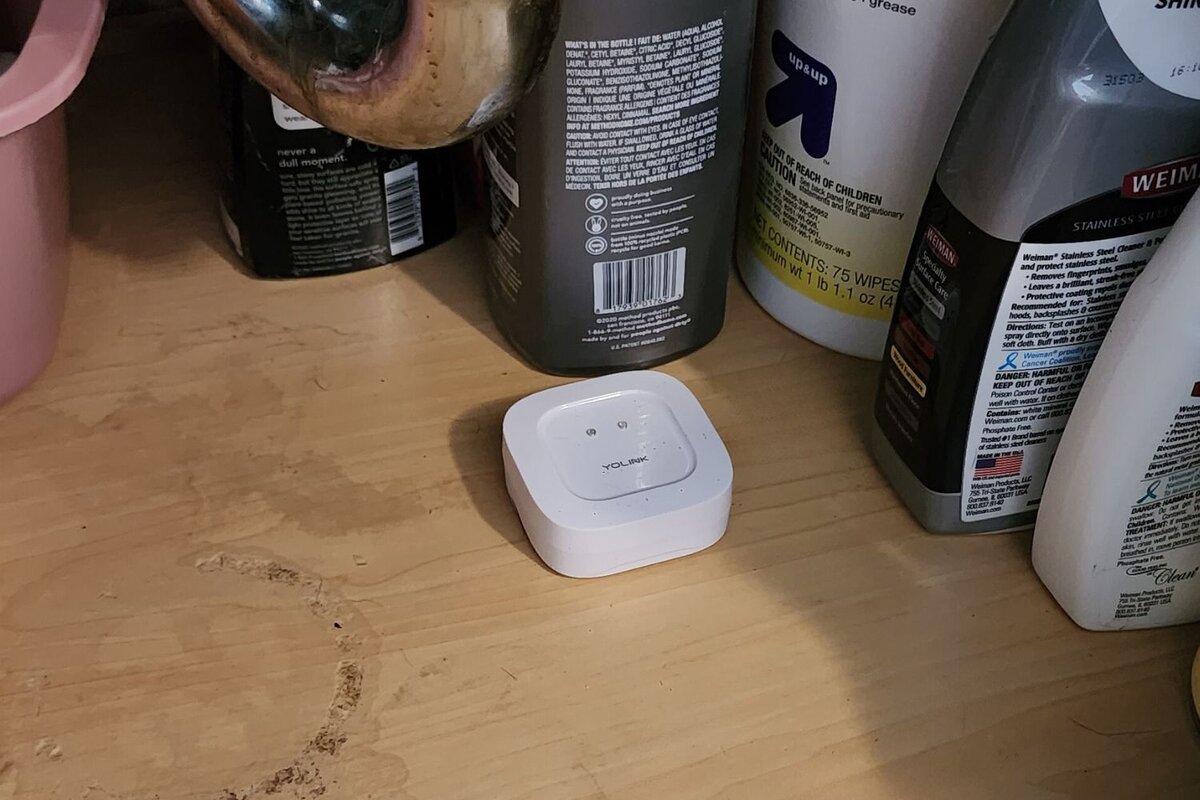
How We Tested the Best Water-Leak Detectors
Obviously, a lot is riding on leak-detection devices. If they don’t fulfill their function, your home could experience devastating water damage or a broken water supply without you even knowing. Therefore, we wanted to make sure that every device we suggested was the real deal.
We began by calling upon all our home maintenance and smart-home experience to develop a list of features we wanted our devices to have. Once we knew what to look for, we performed extensive product research to find a list of devices we thought would hit the mark. We then put these products through hands-on testing by placing them into real-life situations. We simulated leaks under sinks to test their leak detection. We left the house with these leaks underway to see how long would take for the smart water-leak detectors in the group to alert us. We even threw one in the freezer to see if it would warn us of freezing conditions akin to those that might cause frozen pipes.
We compared our test results and features offered by each detector to ensure each product offered a worthwhile value. Since some didn’t, we removed them from our list. Those that did were given awards based on their strengths, and our list of top picks is the result.
Our Top Picks
We performed real-world hands-on testing on the following leak detectors to ensure they offered excellent performance. Be sure to compare each product to find the one that best suits your home’s needs.
Best Overall
Kidde 60WLDR-W Water Leak + Freeze Detector
See ItKidde’s 60WLDR-W water leak and freeze detector is our top choice for its combined value and reliability. This device is WiFi-compatible, but it doesn’t require it. Those seeking straightforward operation need simply to unbox the sensor, install batteries, and set it in the desired location.
However, hooking it up to Wi-Fi for smart operation is equally as easy. Just download the Kidde app, set up a profile, and add the device with the QR code. The app will ask for other information, such as the home’s location and emergency contact information, a feature that alerts a friend if you aren’t around to respond to any notifications. The Kidde leak and freeze detector is compatible with Alexa, Google Home, and iPhone and Android devices.
This model runs on two included AA batteries. It’s relatively small and compact and can fit under a dishwasher, refrigerator, or around a water heater. It has two alert modes: leak mode, which occurs when water touches both contacts and creates a short, or freeze mode, which alerts when the temperature around the device reaches 37 degrees Fahrenheit.
We really liked the multipurpose uses the Kidde offers. Many bad leaks are caused by freezing, and the Kidde’s sensor quickly and loudly alerted us to an issue when we threw it in the freezer. We liked that the unit was easy to set up using the Kidde app, and that the app will automatically bring up emergency contact information if an alert sounds. But we also liked that this device can operate without Wi-Fi, meaning it will trip even if the power and internet service are down. The biggest complaint we can muster is that the contacts are much farther from each other than other models. At about ½ inch apart, it could take longer for the device to trip, though we definitely didn’t have that issue.
Read our full review: Kidde 60WLDR-W Water Leak + Freeze Detector
Product Specs
- Power source: 2 AA batteries
- Alarm type: Audible, listed at 85 decibels but measured at 95 decibels
- Waterproof: Yes
Pros
- Easy to set up using the Kidde app and the QR code on the device
- App collects address information as well as emergency contact info to make calling for help easier
- Emits a 95-decibel alert when water or freezing temperatures are detected
- Works with or without Wi-Fi, so power outages are not a concern
Cons
- Contacts are further apart than all of the other devices, which means they could take longer to trip
Get the Kidde water-leak detector at Amazon, The Home Depot, or Sam’s Club.
Best Bang for the Buck
The Basement Watchdog BWD-HWA Water Alarm
See ItThe Basement Watchdog water alarm is one of the most affordable water-leak sensors on the market. It is also among the easiest to set up: Insert the battery, position it, and turn it on. The sensor will detect pooling water at just 1/32 inch deep, alerting users with a piercing alarm. Although called the Basement Watchdog, it is suitable for use anywhere indoors.
This unit comes with 6 feet of cable that connects the main unit with the sensor. That means it’s really only suitable as is for use in a single room. If you purchase additional wire and connectors, you can extend this distance to a maximum of 100 feet, but each main unit connects with one sensor only. Battery life is excellent, as power is only required in the event of an alarm.
The Basement Watchdog doesn’t benefit from any kind of Wi-Fi integration, and the unit itself is somewhat utilitarian in appearance, but it nevertheless represents excellent value for the money. Despite being a more basic model than others we tested, it reliably detected leaks and excess moisture without us having to spend a lot of money. That makes it an especially nice option for a basement water-leak detector—a dirty basement might not be ideal for an expensive, high-end sensor. We liked that the sensor detaches from the bottom of the unit and provides 6 feet of reach. It’s also plenty loud, measuring at around 100 decibels for us, which was one of the loudest in our tests. The biggest complaint anyone could register is that it doesn’t have Wi-Fi, but for the price, it certainly has its perks.
Product Specs
- Power source: 9-volt battery (not included)
- Alarm type: Audible, listed at 110 decibels but measured at 100 decibels
- Waterproof: Sensor only; main body is not
Pros
- Very low per-unit cost, allowing users to place them in dirty locations without worrying
- Quickly senses water and emits a loud 100-decibel alarm
- Sensor extension allows it to reach up to 6 feet from the alarm itself
Cons
- Budget-friendly price means it doesn’t come with any smart features or Wi-Fi compatibility
Get the Basement Watchdog water-leak detector at Amazon, The Home Depot, or Walmart.
Upgrade Pick
YoLink Water Leak Sensor u0026 Hub Smart Home Starter Kit
See ItLooking for a leak-detection solution that’s capable of integrating with smart devices? This smart water sensor from YoLink can send leak alerts through smartphone banner notifications, SMS text messages, and emails. It can even transmit alerts by integrating with Android and Apple smart devices.
Once the detector is integrated with a smart device, the paired app sets up monitoring routines and tracks history logs to ensure leaks are discovered and noted as soon as possible. Boasting one of the longest wireless ranges in the smart-home industry, the base can connect to individual detectors from up to 1,320 feet in the open air outdoors.
Unlike other smart-home leak detectors, this model isn’t dependent on a home’s Wi-Fi network. Instead, it uses long-range radio frequencies to transmit signals without taking up Wi-Fi network bandwidth. This unit uses notifications to alert you of issues and doesn’t feature a built-in siren alarm, but a compatible siren alarm is available for purchase. YoLink also offers other compatible accessories, like an automatic shut-off valve for sinks.
The biggest downside to the YoLink was that it has physical hardware (the hub) that has to be attached directly to the router. However, once that process is done, adding devices couldn’t be simpler. The app is excellent and allows you to quickly scan a QR code, add the device, and name it within 30 seconds. This is much faster than the other devices’ apps.
The YoLink was the only leak detector we tested that didn’t have an audible alarm. Thus, if the power goes out, there won’t be an alert. However, the individual devices are compact and feature three sets of contacts (two on the bottom and one on the top), ensuring they detect any possible leaks provided the power is on. In testing, the YoLink alerted us to a leak quickly, sending a notification within 5 seconds. This speedy notification is likely due to the hub’s hardwired connection, which does make up for the extra bit of hardware in the house. And, as promised, the hub didn’t have a noticeable impact on the home’s internet service.
Product Specs
- Power source: AC cord and 2 AAA batteries (included)
- Alarm type: App notifications, texts, and emails
- Waterproof: Individual sensors only; main hub is not
Pros
- Sends notifications to your phone in less than 5 seconds
- LoRa technology does not impact internet performance; it didn’t affect the home’s Wi-Fi during testing at all
- Adding devices takes 30 seconds thanks to the QR code and simple app
Cons
- No audible alarm, which is strange because one might not have their phone nearby
- Requires installing a hardwired hub, which none of the other models do
Get the YoLink water-leak detector at Amazon.
Best Wi-Fi
Govee Wi-Fi Water Sensor Alarm + 3 Sensors
See ItThis water-leak detector from Govee detects leaks and can send alerts through Wi-Fi and an audible alarm. Once connected to a home’s Wi-Fi gateway, the detector prioritizes sending alerts via SMS and email. As a safety backup should the Wi-Fi connection be temporarily unavailable, a built-in 100-decibel siren alarm will sound. This leak detector also boasts a high waterproof rating, so it won’t be damaged or destroyed during extended periods of use in high-moisture areas or in the event of full water submersion.
This was by far the easiest set of leak sensors to set up. All we had to do was download the app, set up a profile, and plug in the hub. The hub came preloaded with the sensors in the kit, so we didn’t have to add them, yet had the option to rename them. The sensors each came with batteries that simply required us to pull tabs out to activate them. When we tested the devices, they provided a louder-than-rated 105 decibels and sent an alert to our phone within 10 seconds. The biggest complaint we could come up with was that the sensors themselves aren’t very compact. In fact, they’re quite a bit larger than the other hub model, but at least this hub doesn’t require hardwiring—simply plug in and connect to Wi-Fi.
Product Specs
- Power source: Outlet for hub; 2 AAA batteries for sensors
- Alarm type: Audible, listed at 100-decibel audible and measured 105 decibels, smartphone app
- Waterproof: Individual sensors only; main hub is not
Pros
- Kit comes preloaded with 3 sensors, but you can connect up to 10
- Audible alarm works without Wi-Fi and is actually louder than rated at 105 decibels
- Simple installation process requires just plugging in the hub and connecting to Wi-Fi
Cons
- The sensors are quite a bit larger than some of Govee’s direct competitors
Get the Govee water-leak detector at Amazon.
ALSO TESTED: Masswell 3-Pack 120-Decibel Water Leak Detector Alarm
The Masswell alarms were disappointing. The alerts weren’t nearly as loud as they claimed (we measured them at only 80 decibels versus the advertised 120), and they are anything but waterproof. The plastic is cheap and brittle, and the battery compartments are tricky to work with. While the price is OK, there are much better options on the market that we would trust way before this kit.
ALSO TESTED: Resideo L1 Water Leak Detector
The Resideo L1 water-leak detector is a hard pass. We couldn’t even link our model as it would not turn on, even after switching in three sets of new batteries. Eventually, it did turn on, but for a device that is supposed to protect a home from water damage, reliability is definitely a concern.
Jump to Our Top Picks
What to Consider When Choosing a Water-Leak Detector
Water-leak detectors offer a variety of features that influence their functionality. Understanding the differences among these features is important in helping to determine the best water-leak detector for a home.
Size and Location
A drop in water pressure can often indicate a leak but does not reveal where it is coming from. To pinpoint the problem, most water-leak detectors are designed to be placed next to water-supplied appliances and plumbing fixtures like toilets, sinks, refrigerators, hot water heaters, and washing machines. They can also be set up in basements, attics, crawl spaces, and any other areas prone to leaks from rain and melted snow or ice. Putting a device in the upper areas of your home can help quickly identify leaks in a roof or ceiling.
While any size of water-leak detector will work for larger open spaces like basements and garages, a smaller detector might be necessary for cramped places, like behind fridges and toilets. Many plug-in water-leak detectors have sensor cables that are several feet long, allowing them to detect leaks a significant distance from where the base of the detector is located.
Power Source
Water-leak detectors can be powered by batteries or a home’s AC wall outlet, but battery-powered detectors are the most common. Battery-powered leak detectors can be placed in practically any location independent of an additional power source, making them ideal for locations that don’t have nearby electrical outlets.
Although battery-powered detectors are convenient, the disadvantage is that the batteries can die and leave that area vulnerable to undetected leaks. Fortunately, many battery-operated models can last for several years on a single set of batteries and have indicators that signal when battery life is low.
Built-in Alarm
Most water-leak detectors have built-in alarms that emit a loud beep or ring when a leak is detected. Also called “local” alerting, these built-in alarms often have the same or greater decibel rating (85+ decibels) as smoke and fire alarms (75+ decibels) and will stay active for a period of several hours to a few days until they are manually silenced. Some water-leak detectors also have audible alarms that indicate low battery life.
Smart-Home Integration
Along with, or in place of, local alerting, some water-leak detectors are capable of integrating with smart-home technologies like Amazon Alexa, IFTTT, and other third-party services. This partnership allows you to receive alerts and notifications from your smartphone and other smart hub devices, such as an Amazon Echo.
In contrast to local alerting, these smart leak detectors are capable of sending notifications to a user’s phone, even when they’re not at home, allowing them to quickly detect leaks regardless of their location. Some smart leak detectors use the home’s Wi-Fi network connection to transmit a signal, while others use a dedicated service for a monthly fee.
Automatic Water Shutoff
Although uncommon, some water-leak detectors include an automatic water shut-off system that turns off the supply as soon as it detects a leak. These “in-line” units are installed directly onto a water supply plumbing line and continually monitor a home’s water usage to detect leaks. Once a leak is found, they function much like a manual water shut-off valve by closing off the home’s water supply.
Although commonly tied into a home’s main water line, these detectors can also be placed on a single water line, such as the hot water heater supply. However, when installed onto the main water supply line, they offer whole-house protection from leaks instead of only locally isolated detection.
Leak detectors that incorporate automatic shutoff are typically expensive—usually several hundred dollars—but could potentially prevent thousands of dollars in water damage, making the extra expense worthwhile. These units are especially valuable for vacation homes and rental properties where the owner is frequently offset and unable to monitor for leaks personally.
Additional Sensors
Some water-leak detectors can monitor temperature and humidity along with leaks. This functionality can act as an effective preventive measure against future problems, as freezing temperatures sometimes lead to frozen and broken pipes, and humidity can contribute to mold and mildew growth.
Most leak detectors with additional sensors also feature smart technology, allowing users to monitor these conditions constantly from their smartphone and other devices.
Tips for Using a Water-Leak Detector
To gain the most benefit from a water-leak detector, first identify the sources of potential leaks. If you are primarily concerned about plumbing fixtures, a small and compact leak detector will fit in the tight and confined spaces under sinks and next to toilets, washing machines, and dishwashers. If you’re concerned about flooding and need to cover a large surface area of floor space, consider a leak detector with a long and extendable sensor cable.
If the detector relies on a built-in siren for alerts, it needs to be loud enough that you can hear it throughout the house, regardless of where the detector is located. This is generally relatively easy to accomplish inside the house, but some alarms might not be loud enough for use in a garage (especially a detached one) or an insulated basement. If you can’t hear the alarm from those locations, consider upgrading to a detector with a louder siren or one that can send alerts directly to a smartphone. Here are a few more tips for using a water-leak detector:
- Just like with a smoke alarm, routinely test a leak detector once every 1 to 2 months to verify it’s still working.
- If a battery-operated leak detector doesn’t include a battery-life indicator, replace the batteries every 1 to 2 years to ensure they’re fully charged.
- If a leak detector isn’t rated to withstand full water submersion, don’t place it in an area prone to flooding.
Water leaks caused by corroded pipes can also affect the color and taste of water. However, a number of other factors may be the cause, so it’s a good idea to check our article on common water problems.
FAQs
Do you still have some lingering questions about water-leak detectors? Consider the answers to the following frequently asked questions.
Q. Where do you put a water-leak detector?
You can put a water-leak detector next to toilets, sinks, dishwashers, washing machines, and hot water heaters, as well as in garages, basements, or anywhere else prone to flooding. Putting a water-leak detector in the attic can help identify problems with the roof caused by snow or storm damage.
Q. How do I find out where my water is leaking from?
If your water-leak detector features a local alerting sensor and siren, the leak will be coming from where your detector is located and the siren was triggered. If you have a WiFi-enabled or smart leak detector, your smartphone and other connected devices will identify the location of the leak.
Q. How do you install a water-leak detector system?
Set a water-leak detector directly on the ground (which doesn’t require any actual installation), or install it on the wall with double-sided tape, adhesive, or a similar mounting material.
Q. How long do water-leak detectors last?
The average lifespan of a water-leak detector will vary between manufacturers, but any given detector is likely to remain functional for several years. However, this lifespan could be reduced by total water submersion if the detector has a relatively low waterproof rating. A leak detector’s battery life can last anywhere from 1 to 10 years.
Meet the Tester
Tom Scalisi has been in the trades for over two decades. He loves to share his knowledge of construction, home improvement, tools, techniques, and products with the readers of Bob Vila, This Old House, Family Handyman, and on even his pest control website, Riddabugs.com.
Additional research provided by James Fitzgerald and Deirdre Mundorf.
